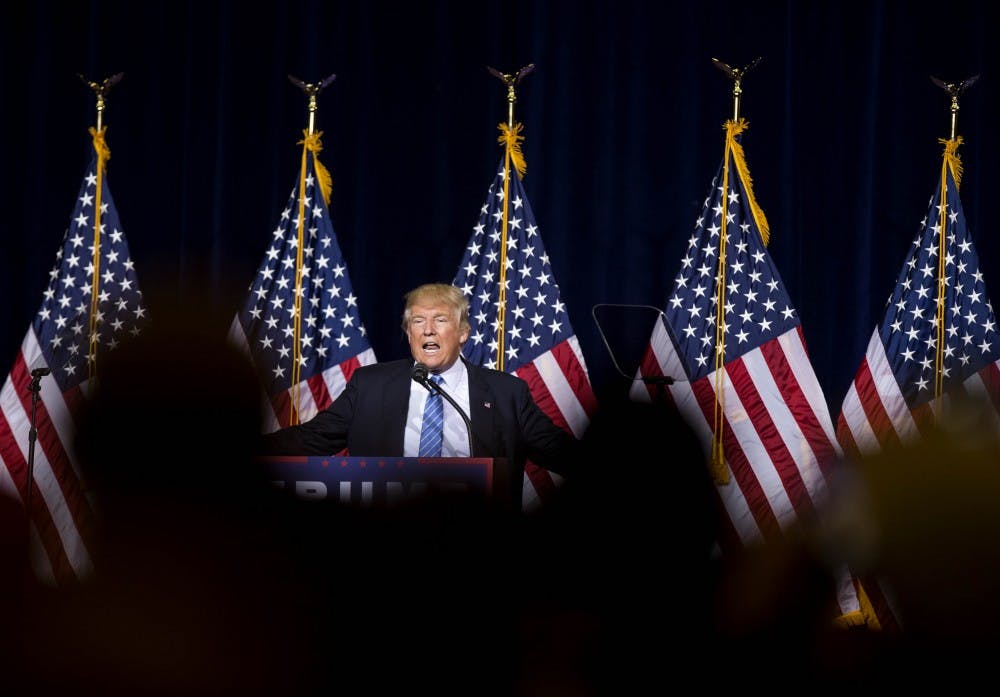President Donald Trump signed an executive order on Thursday aimed at enforcing freedom of speech on college campuses, along with improving transparency and accountability.
The order, titled "Improving Free Inquiry, Transparency, and Accountability at Colleges and Universities," would punish colleges for violating its rules by denying them certain types of federal funding.
"Every year, the federal government provides educational institutions with more than $35 billion in research funding, all of that money is now at stake," Trump said from the East Room of the White House during a signing ceremony today. "That's a lot of money."
"If a college or university does not allow you to speak, we will not give them money,” Trump said to the attendees, which included Turning Point USA founder and executive director Charlie Kirk, who spoke at ASU a day before.
A senior administration official spoke to reporters on a conference call over the phone Thursday morning to preview the order, noting that it directs 12 grant-making agencies to ensure that institutions that receive any federal research or education grants promote "free inquiry through compliance with all applicable federal laws, regulations and policies."
According to the official, the executive order does not apply to student aid programs like tuition, fees or stipends.
The order also directs the Department of Education to increase transparency and accountability by publishing program-level data into the College Scorecard, including earnings, debt, default and loan repayment rates.
The second provision in the order is intended to keep students informed about the financial risks associated with student loans and to help them make more informed choices about their college education.
The administration official declined to comment on what kinds of speech would be protected, only saying that the order's intention is to "promote free speech more broadly across college campuses."
"Schools are already supposed to be following these rules," the official said. "And essentially, each agency already conditions grants, and schools are certifying that they’re following these conditions, and they will just add free speech as one of those conditions."
The executive order comes a year after a measure protecting free speech was signed into state law by Arizona Gov. Doug Ducey following contentious demonstrations on college campuses nationwide, including a riot at University of California, Berkeley in reaction the invitation of a controversial conservative speaker to campus.
Read More: What do Arizona's new laws on free speech mean for ASU students?
House Bill 2563 outlined policies intended to "ensure the fullest degree of intellectual freedom and free expression," including requirements that the Arizona Board of Regents set up committees to monitor free speech and report infringements based on the content of individual messages.
Experts say the presence of existing law means the executive order won't have a significant effect in Arizona.
ASU law professor Charles Calleros said in an emailed statement that the enforceability mechanism is already in place under current law.
"The (order's) policy to 'encourage institutions to foster environments that promote open debate' is one that every university should embrace and is one that I know ASU embraces," Calleros said. "It’s not clear why the threat of revoking federal funding is necessary to achieve compliance with constitutional law."
In a statement, a University spokesperson echoed that sentiment, pointing to an ABOR policy which already holds ASU to a high standard in terms of freedom of speech.
"As a public university, ASU is already bound by the First Amendment and strives to ensure the fullest degree of intellectual freedom and free expression," the spokesperson said in an emailed statement.
The ABOR policy further defines the role state universities play in protecting free speech, which it states is not to "shield individuals from speech protected by the First Amendment, including ideas and opinions that may be unwelcome, disagreeable or deeply offensive."
Even though rules protecting freedom of speech on campuses already exist, Trump emphasized the value of the executive order in remarks made at the signing ceremony.
"We reject oppressive speech codes, censorship, political correctness, and every other attempt by the hard left to stop people from challenging ridiculous and dangerous ideas," Trump said "These ideas are dangerous. Instead, we believe in free speech, including online and including on campus."
State Sen. Paul Boyer (R-Glendale), who sponsored Arizona's free speech bill, said in an emailed statement that he hasn't read Trump's executive order yet, but that Arizona is already ahead of the game in terms of free speech.
"Arizona is ahead of the curve regarding free speech on public university and college campuses," Boyer said in the statement. "It's my hope that President Trump recognizes Arizona for the great work state universities and colleges have already done to protect the First Amendment rights of all Arizona students."
Reach the reporters at isaac.windes@asu.edu and vandana.ravikumar@asu.edu or follow @isaacdwindes and @vandana_rav on Twitter.
Like The State Press on Facebook and follow @statepress on Twitter.




